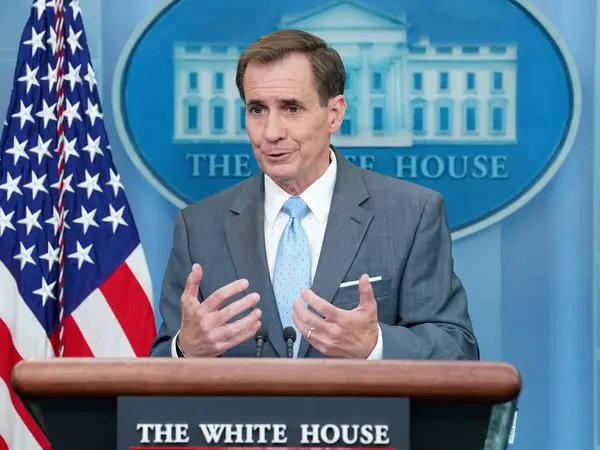The United States says it is working to advance a partnership for air defense among Middle East allies to counter the growing missile threat from Iran.
Days before President Joe Biden’s trip to the region and his meeting with Saudi Arabia’s King Salman and visit to Israel, National Security Council Coordinator for Strategic Communications, John Kirby speaking of the Middle East on Thursday said, “What happens over there definitely affects us here at home.”
The plan to set up coordination between air defenses of Saudi Arabia, Israel, the United Arab Emirates and other allies goes back months, as The Wall Street Journal reported in June that a secret meeting took place between top military officers of the countries involved in Sharm El Sheikh, Egypt in March.
Representatives came from Israel, Saudi Arabia, Egypt, Qatar and Jordan.
In June, Israeli leaders were more forth coming is mentioning air defense cooperation with Arab countries under US aegis, but Kirby on Thursday spoke more clearly than before.
“There’s a greater collaboration across the region on issues like air defense, and we’re continuing to work on integrated air defense capabilities and frameworks across the region… because the whole region is concerned about Iran and their burgeoning and growing ballistic missile capabilities… and continued support for terrorism across the region,” he said.
Iranian officials appear to be concerned with the growing close ties between Israel and rich Arab oil producers, something that would be taboo in the Arab world prior to 2020 when with Abraham Accords several Arab countries normalized ties with Israel. Saudi Arabia, although with reported secret cooperation with Israel, has so far preferred not to openly establish diplomatic ties.
Iran’s Supreme Leader Ali Khamenei, hardliner President Ebrahim Raisi and others have warned Persian Gulf Arab countries not to rely on Israel or allow it to establish a military-intelligence foothold in the region.
In April, Raisi compared friendship with Israel to keeping “a snake” in proximity. Those Muslim countries that "normalize relations with the blood-shedding Zionist regime resemble those who would keep a snake in their sleeves," he said.
But with no agreement on its nuclear program after 15 months of diplomacy with the West and its growing atomic potential and missile program, Tehran has little concrete arguments against a brewing region-wide alliance against its ambitions.
Kirby also told reporters, “There is a growing convergence among nations in the region of concern about [Iran’s] advancing ballistic missile program and their support to terror networks.”
Among the Persian Gulf countries involved in military discussions, only Qatar maintains friendly ties with Iran, trying to be a broker in jump starting nuclear talks stalled since March, but Tehran apparently is hoping its potential to supply oil to world markets after Russian sanctions can fetch more concessions from the United States.
